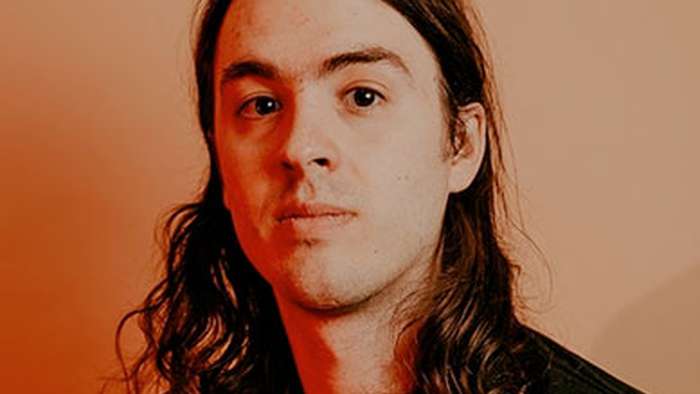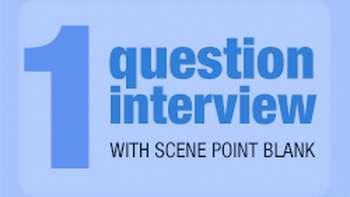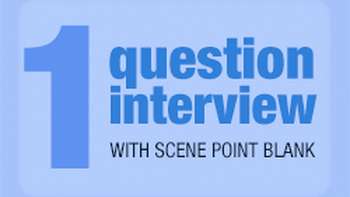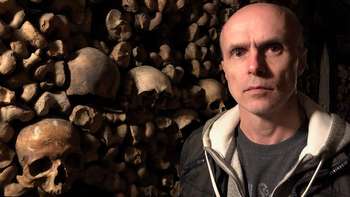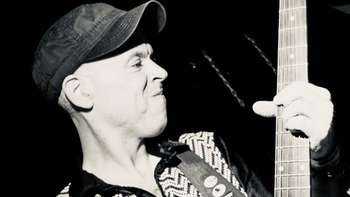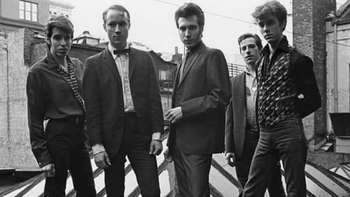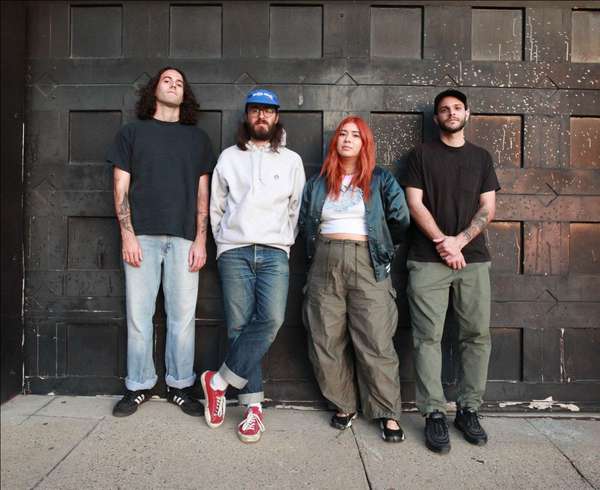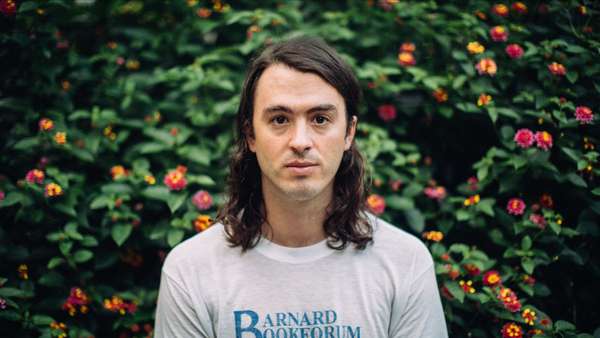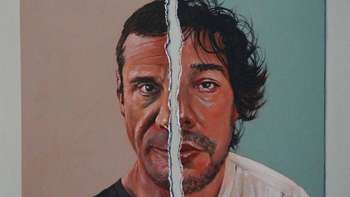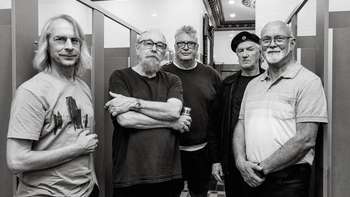Scene Point Blank: What sort of instruments or sounds were inspiring to you when you were getting Glitterer going?
Ned Russin: I think the biggest change is the use of synths. I’m not going to pose like I’m some electronic musichead. ‘cause I’m not. I just like bands that use synths sometimes…
But just listening to some bands…ELO, who I was listening to a lot at the time, were able to do a kind of traditional sound by untraditional means. They were just writing music that I enjoyed because it was like ‘weird 60s pop stuff. So that kind of thing proved to be pretty inspiring. Also, one of the biggest bands for me at the beginning was Sneaks. She’s on Merge now, but she’s just a one-person band. She does like drum machine, bass, singing. Her stuff is really cool and I felt like it gave me permission to do something similar: to mess around with electronic drums, to mess around with weirder melodic ideas and stuff. So those two bands in the beginning were really big for me.
Scene Point Blank: Did you already know piano?
Ned Russin: Yeah. Piano was my first instrument. Really, I had forgotten almost all of it, but I can play melodies on piano. Chords give me a lot of trouble, but that’s also part of the fun of writing with keyboards and synths. I’m kind of figuring out what is in my head in a new way. When I play bass, it’s very easy for me to figure out what I have going on in my head because I know how to play the instrument…with keyboard, I’m trying to figure out and then I stumble on something -- it was an accident and it ends up being something that gives me a whole new idea. That sort of messing around…has allowed me to experiment in a way that I’m not able to with bass because I’m too familiar with it. That level of unfamiliarity has been positive for my creative process.
Scene Point Blank: You opened a show at Brooklyn Bazaar back in March –
Ned Russin: Yeah, with Youth of Today.
Scene Point Blank:I got there late and missed you unfortunately, but Shark Attack (another hardcore band opening for Youth of Today) --
Ned Russin: They said I was weird.
Scene Point Blank: Yes! They were giving shout outs to all the bands that played, and –
Ned Russin: Yeah, they said I was weird, but then the guitarist said, “No, that was cool.” So don’t worry. Don’t worry. And I talked to them.
Scene Point Blank:You did?
Ned Russin: Yeah. I didn’t confront them. I wasn’t like –
Scene Point Blank: Oh, I wasn’t trying to start drama –
Ned Russin: No, no. Yeah, I talked to them afterwards, and he was slightly apologetic because that was an awkward exchange -- a public exchange -- and I wasn’t offended by it. Yeah -- it was weird.
Scene Point Blank: Yeah, compared to the rest of the lineup.
Ned Russin: And I get that. And that’s kind of the point…Especially in hardcore, the whole thing was supposed to be an antagonistic, rebellious idea.
I guess the music is still harsh to outside listeners, but when it’s something that you can kind of pinpoint back to 15, 20, 25, 30 years ago -- to what bands you’re referencing -- then it becomes something that is no longer dangerous. It becomes an aesthetic and not an idea. So, I’m interested in working with the idea and trying a different sound.
So, yeah, me being on a Youth of Today show was “weird.” And I know that. And a bunch of people came late, and I expected that, and a lot of people stood in the back and I expected that as well. But there were people up front, and there were people watching, and I appreciate that. I know it’s not for everybody. I know some people are not going to take to it, and that’s fine. But it doesn’t mean that I’m not gonna try and that I’m not gonna play. That maybe is a good way to sum up the entire band, that whole exchange.
Scene Point Blank: Yeah, and again sorry I got there late! I’m excited to see you tonight.
Ned Russin: It’s no problem. Thank you.
Scene Point Blank: Let’s talk about lyrics.
From what I gather, you don’t mind if listeners interpret your lyrics wrong. Why not?
Ned Russin: I don’t want to tell people what to think. I feel like my role as a person creating something is to create it, and to not tell people how to interact with it…what to get from it… how they should hear it. So it becomes difficult because I believe there can be wrong interpretations, but I don’t want to tell people what the right interpretation is or what the wrong interpretation is because I think that sets up this false binary of “getting it” and “not getting it.” To me, there are serious goals with the lyrics that…take a little bit more than just listening to something quickly to “get.” That’s kind of the idea behind it, to a certain extent. If you want to dig, there’s a fair amount to dig through, and if you don’t, I’m not trying to bog you down. That goes back to…not telling people how to listen to the music. I think lyrics are very important. I think that’s a common idea held in the music world, but I’m not gonna tell anyone how to do what they do in private.
"I never want to put something negative into the world and just say, “Everything sucks. What’s the fuckin’ point?” It’s very easy to feel that way..."
Scene Point Blank:Has your lyrical writing process changed since your creative writing program?
Ned Russin: Not really. The skills that I got in creative writing from school were really only applicable to…a different medium. ‘Cause I studied fiction writing. Writing a story is very different than writing lyrics, and writing lyrics is different than writing poetry. And that’s different than writing a journalistic piece. Which is different than memoir, you know? Everything has its own place.
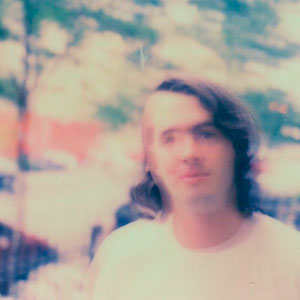 I was able to work on things in a new light and I think the best thing for me was being forced to try and produce content even when I didn’t want to. Like, I had to write a story however many times a semester, and I had to write a thing for this magazine I was writing at…That kind of skill is invaluable because you can’t just wait for inspiration to hit. Showing up and practicing is an important skill. So that was very helpful, and proved to be important for the writing of the Glitterer stuff so far. Those things have been existing in very different places in my mind.
I was able to work on things in a new light and I think the best thing for me was being forced to try and produce content even when I didn’t want to. Like, I had to write a story however many times a semester, and I had to write a thing for this magazine I was writing at…That kind of skill is invaluable because you can’t just wait for inspiration to hit. Showing up and practicing is an important skill. So that was very helpful, and proved to be important for the writing of the Glitterer stuff so far. Those things have been existing in very different places in my mind.
Scene Point Blank: Well the cliché question for all college graduates is, “What do you plan to do with the degree?”
Ned Russin: I’m working on a book.
Scene Point Blank: Awesome!
Ned Russin: So I guess that’s what I’m planning to use it for. I’m putting [those writing skills] to use for that practical application: I studied fiction writing and now I’m trying to do fiction writing. Maybe not as a career. I don’t really plan that far ahead. More so, I used school as a way to challenge myself…to learn new things, to study things that I would not have the opportunity on my own, and to have things explained to me that are so difficult that…I would never be able to understand on my own. Having someone who’s a Foucault scholar or a Derrida scholar break down Derrida to you…so you could understand it layman’s terms is a really great thing to take advantage of if you have the opportunity.
I just wanted to go to school as a personal challenge to see if I was capable of something besides music…I feel very fortunate to have had the opportunity that I had, to have the teachers that I had, and the discussions that I had. They’ve really been great. They really helped to shape the way that I’ve been thinking about things recently, and the stuff that I’ve been doing, and the books that I’ve been reading.
Scene Point Blank: You mentioned that you feel regret when you look back at nihilistic lyrics –
Ned Russin: No. No, not regret.
Scene Point Blank: No? Correct me.
Ned Russin: I believe what you’re referring to is something that I said during a show. It’s not that I think the lyrics are inherently nihilistic, it’s that in the place where I was [then], I was feeling somewhat nihilistic, and I wrote them. I realized when I looked at them later, that they weren’t nihilistic. So…I was thankful that I was able to reassess things. At the same time there was a lot of room for optimism and hope. A lot of stuff that I put in there, I was able to look back on and realize there was room for me to work beyond that.
That’s something that I never want to do. I never want to put something negative into the world and just say, “Everything sucks. What’s the fuckin’ point?” It’s very easy to feel that way -- and at that time -- and still today it’s very easy to feel that way. I listen to a lot of talk radio and NPR on the road, and in the two weeks that I’ve been gone: El Paso and Dayton happened; the UN released a paper on climate change saying that if we don’t change we live, the world is going to have a very hard time coming back. And just listening to daily news of American citizens being sent abroad and dying because of absurd nationalistic xenophobic tendencies among us. These things -- it’s very easy to look at that for a second and be so overwhelmed that you can’t function. And I understand that, but we’re still all alive. We still have to wake up every day. We still have to go on. And because we have to do all these things -- we should at the same time, I believe -- do that and try and make it better. Make it worth it, in a sense, which doesn’t mean that you have to be out on the front lines doing anything, but it means that you can offer people compassion and empathy and offer that to yourself as well. And those small things are able to make a difference.
Scene Point Blank:Yes.
Ned Russin: Yeah. That’s the thing. Nihilism is a natural reaction, and I don’t reject the nihilism, but beyond the nihilism, there is something there. That’s kind of a false friend -- that idea that the world is fucked. That is my 2019 stance on my old self.
Scene Point Blank:I was gonna ask -- Hhow do you think you can confront these political issues that you’ve just mentioned through your art?
Ned Russin: That kind of returns to the question of interpretation, and that’s something that I think about.
I think everything is political. I think everything you think and do is tied into politics. People try and say -- I think especially in the current political climate -- there’s a lot of discourse around, “That person’s just trying to make this a political situation.” Which is so ridiculous. Of course it’s a political situation. Everything is political because everything ties into the way the world works, which is political. It may not have a political party associated with it or a politician behind it, but your viewpoints, your morals, your person -- is political.
I say things, and that’s inherently political. I’ve been less and less afraid to say explicitly blunt things. For example, the Planned Parenthood in the place where I grew up, Wilkes-Barre, Pennsylvania, was vandalized recently. And I just tweeted that it’s sad that that happened, but the women of Wilkes-Barre and everywhere else should be unafraid to go to Planned Parenthood to get healthcare, which includes abortions. Saying that kind of stuff is a way to make your beliefs known.
But also -- on a less blunt level -- I think writing personal lyrics allows a person to listen to it and offer empathy, to connect with somebody else…it’s empathy through shared experience or shared emotion, but I think it’s empathy nonetheless. And I think that is an extremely important political thing. Because I think in the current climate, people will say, “I’m not blank, but…”, and it’s like a trope. People say, “I’m not racist, but…”, or whatever the case may be. But…I believe a lot of those kind of real insensitive and selfish tendencies come from a person lacking empathy. A person being deported may not be relatable to somebody who is a born white American citizen, who doesn’t have that threat. But to know: Yeah, that happens, and that shouldn’t happen. Because that person is a human being just like me who has wants and desires and needs. That’s just basic empathy to me. So that’s kind of my point of view: connecting with people on an emotional level is an example of empathy, and to me that’s…that’s a political statement. And I want people to take that away from engaging with the music.
